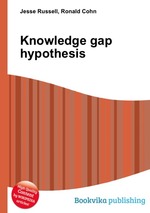Knowledge gap hypothesis
Jesse Russell Ronald Cohn
бумажная книга
High Quality Content by WIKIPEDIA articles! The Knowledge Gap Hypothesis explains that knowledge, like other forms of wealth, is often differentially distributed throughout a social system. Specifically, the hypothesis predicts that “as the infusion of mass media information into a social system increases, higher socioeconomic status segments tend to acquire this information faster than lower socioeconomic-status population segments so that the gap in knowledge between the two tends to increase rather than decrease” Phillip J. Tichenor, then Associate Professor of Journalism and Mass Communication, George A. Donohue, Professor of Sociology, and Clarice, N. Olien, Instructor in Sociology – three University of Minnesota researchers – first proposed the knowledge gap hypothesis in 1970.


